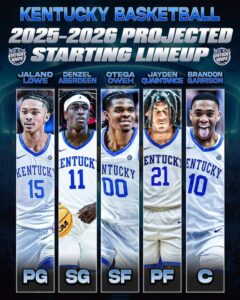
Alabama’s Nate Oats Declines Maryland’s $25M Offer, Reaffirms Commitment: ‘This Is My Home, We Belong Together
In a significant development in the world of college basketball coaching, Maryland’s pursuit of Alabama’s head coach, Nate Oats, has been publicly rebuffed. The Terps offered Oats a massive $25 million contract in a bid to lure him from the Crimson Tide, yet Oats, in a statement released shortly after, reaffirmed his commitment to Alabama, saying, “This is my home, we belong together, money is not on my mind.”
This latest chapter in the ongoing saga of high-profile coaching moves is not only a fascinating look at the landscape of college sports but also speaks to the deep-rooted loyalty and long-term vision that Oats has for Alabama basketball. In this article, we explore the reasons behind Maryland’s offer, Nate Oats’ decision to stay with Alabama, the broader implications for both programs, and what it means for the future of college basketball coaching.
The Maryland Offer
Maryland’s interest in Nate Oats began to gather steam following the resignation of their previous head coach. The Terps, a program with a storied history in NCAA basketball, were looking for a head coach who could lead them back to national prominence. After an extensive search, Maryland’s athletic department identified Oats as their top target. His success at Alabama, a program that had long struggled to compete at a high level in the Southeastern Conference (SEC), made him an attractive candidate.
Oats took over Alabama in 2019 and quickly turned the program around, leading the Crimson Tide to an SEC championship in 2021. His fast-paced, three-point-oriented offensive style became a hallmark of Alabama’s success. Over the past few seasons, Oats has established himself as one of the most successful and innovative coaches in college basketball, drawing attention from powerhouse programs across the country.
In light of his accomplishments, Maryland’s offer was monumental. The reported $25 million contract, which would have made Oats one of the highest-paid coaches in the nation, was a statement of intent. Maryland was prepared to make Oats one of the centerpieces of their revival, offering not just financial incentives but a fresh opportunity to lead a program with a rich history and passionate fan base.
While Maryland’s desire to secure Oats was understandable, the timing of the offer raised questions. Oats was in the midst of building something special at Alabama. The Crimson Tide had just completed one of their most successful seasons in recent history, making a deep run in the NCAA Tournament and showing signs of sustained success. For Maryland to come in with a financial offer of this magnitude seemed to be a direct challenge to Oats’ commitment to Alabama and to his long-term vision for the program.
Oats’ Rejection: Loyalty and Vision for Alabama
Nate Oats’ decision to decline Maryland’s overtures and remain with Alabama sent shockwaves through the college basketball world. For many, the rejection of a $25 million offer from a prestigious program like Maryland was unexpected, especially given the financial incentives and the opportunity for a new challenge. However, Oats’ response made it clear that money wasn’t his primary motivation.
In his statement, Oats explained his decision, saying, “This is my home. We belong together. Money is not on my mind. I’ve built something special here at Alabama, and I’m committed to seeing it through.” This sentiment reflected Oats’ deep connection to the program and his desire to continue building a legacy at Alabama.
For Oats, staying at Alabama is about more than just loyalty—it’s about the opportunity to build something sustainable and long-lasting. Since taking over as head coach, Oats has turned Alabama into a nationally recognized powerhouse. The program is now a perennial contender in the SEC, consistently competing for conference titles and NCAA tournament berths. The team has developed a strong identity under Oats’ leadership, emphasizing high-paced, high-scoring play, and recruiting top-tier talent from across the country.
In many ways, Oats’ decision to stay is also a reflection of the growth of Alabama’s basketball program. The athletic department has fully committed to supporting the basketball team, investing in facilities, and giving Oats the resources he needs to continue building a competitive program. This commitment from the administration likely played a significant role in Oats’ decision to reject Maryland’s offer. He clearly believes that the foundation he is laying at Alabama will lead to even greater success in the years to come.
Furthermore, Oats has developed a close bond with the players and the fan base at Alabama. In his time as head coach, he has built a reputation for being approachable and relatable to his players, fostering a culture of accountability and mutual respect. This connection to the team and community is something Oats clearly values, and it likely factored heavily into his decision to stay at Alabama.
What Does This Mean for Maryland?
While Maryland’s pursuit of Oats ultimately ended in disappointment, the Terps’ aggressive offer was not without merit. The desire to bring in a proven, successful coach to lead their program speaks to Maryland’s ambition to return to national relevance. The Terps have historically been one of the top programs in college basketball, with a national championship in 2002 and consistent success in the NCAA tournament. However, in recent years, the program has struggled to reach the heights it once did, leading to the search for a new direction.
With Oats’ decision to stay at Alabama, Maryland’s search for a head coach continues. While the Terps are undoubtedly disappointed by the outcome, they will likely turn their attention to other high-profile candidates in the coaching market. There are a number of established and up-and-coming coaches who could potentially take over the reins at Maryland, but the challenge will be finding someone who can provide the stability and long-term success that the program needs.
One of the key takeaways from Maryland’s pursuit of Oats is the growing importance of financial resources in the hiring of college basketball coaches. The $25 million offer demonstrates that schools are willing to open their coffers in order to attract top-tier talent to lead their programs. This trend is not limited to Maryland—many high-profile programs are now investing heavily in their basketball coaches, recognizing that the right leader can have a transformative impact on a program’s fortunes.
For Maryland, the next steps will involve finding a coach who can deliver immediate results while also rebuilding the program for sustained success. The Terps’ search will likely shift to other proven coaches or rising stars in the college basketball world.
The Bigger Picture: The Landscape of College Basketball Coaching
The drama surrounding Oats and Maryland is just the latest example of the high stakes involved in the world of college basketball coaching. The amount of money being invested in coaches is increasing every year, and the competition for top talent is only getting more intense. Schools are now willing to make enormous financial commitments in an effort to secure the best possible leaders for their programs.
This trend reflects the increasing commercialization of college sports, where the pressure to win and generate revenue is greater than ever. In many ways, college basketball has become a multi-million dollar industry, and coaches are viewed not just as teachers and mentors but as high-paid executives responsible for the success of their programs.
The intense financial competition is also leading to some interesting shifts in the market. As we’ve seen with Oats, many coaches are becoming more selective about the programs they choose to lead. While financial incentives are certainly a factor, coaches are increasingly looking for environments where they can build something meaningful and long-lasting, rather than simply jumping to the highest bidder.
This shift also highlights the growing importance of stability in college basketball programs. Coaches like Oats are placing a premium on building a program from the ground up, rather than hopping from one job to another in search of a bigger payday. The long-term relationships that coaches develop with players, staff, and fans are becoming increasingly valuable, and many top coaches are choosing to stay put and continue to build their legacies in familiar environments.
A Win for Alabama, A Setback for Maryland
Ultimately, Nate Oats’ decision to reject Maryland’s $25 million offer is a victory for Alabama and a setback for Maryland. Oats’ commitment to the Crimson Tide reflects the deep connection he has to the program and the community, as well as his belief in the long-term potential of Alabama basketball. His decision to stay also highlights the growing importance of loyalty and stability in the world of college basketball coaching.
For Maryland, the search for a new head coach continues, and the Terps will need to look for someone who can help rebuild their program and lead them back to national relevance. As the coaching landscape continues to evolve, one thing is clear: the stakes are higher than ever, and the battle for top talent will only intensify.
As for Oats, his decision to remain in Tuscaloosa solidifies his place as one of the premier coaches in college basketball. With his vision, leadership, and commitment to Alabama, the Crimson Tide are well-positioned for continued success in the coming years. And as college basketball evolves, Oats is proving that sometimes the best move is to stay put, build something great, and see it through to fruition.
This version delves into the broader context of coaching dynamics, the financial pressures of the industry, and Nate Oats’ future at Alabama.





